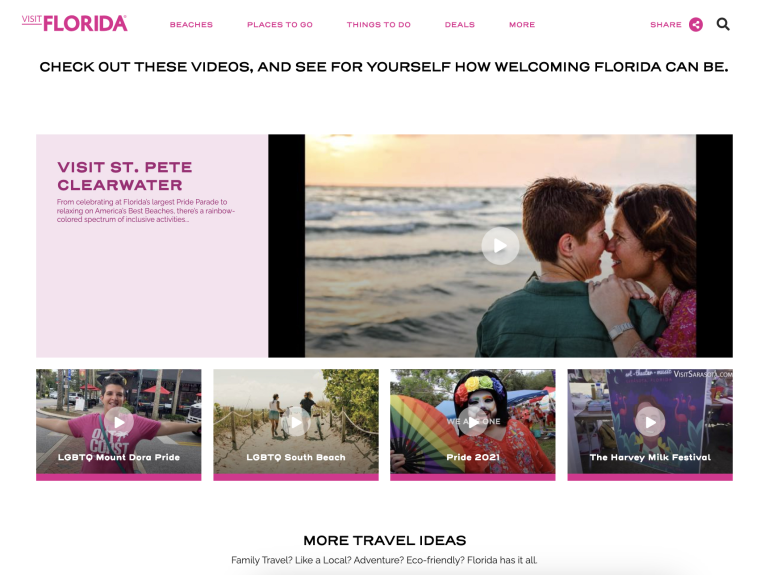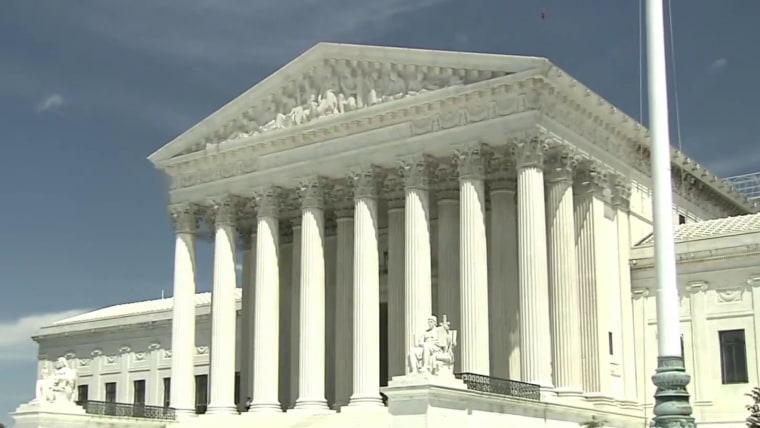Florida’s official tourism site removes ‘LGBTQ Travel’ section
Florida’s official tourism website quietly removed a landing page for the state’s LGBTQ-friendly travel destinations sometime in the past four months.
The website for the state’s tourism marketing corporation, VisitFlorida.com, had an “LGBTQ Travel” section that no longer exists, according to archived versions of the site viewable on the Internet Archive. The landing page previously featured blog posts and videos related to the state’s gay-friendly beaches, Pride events and LGBTQ road trip ideas.
“There’s a sense of freedom to Florida’s beaches, the warm weather and the myriad activities — a draw for people of all orientations, but especially appealing to a gay community looking for a sense of belonging and acceptance,” the landing page used to read. “Whether you’re a couple seeking a romantic getaway or a modern family searching for kid-friendly fun, here are some LGBTQ-friendly destinations for you, throughout the Sunshine State.”
The link where the LGBTQ Travel page had been (https://www.visitflorida.com/things-to-do/cultural/lgbtq/) now directs users to a general “things to do” landing page. It is unclear exactly when the landing page was removed, but it was available as recently as April 19, according to the Internet Archive. It is also unclear why Visit Florida, a nonprofit created as a public-private partnership by the Florida Legislature in 1996, removed the landing page and who was behind the decision.
The website does continue to provide travel information for destinations specific to other minority groups, including Black and Hispanic travelers.
Visit Florida did not immediately return a request for comment.

Rachel Covello runs OutCoast, a travel blog that promotes Florida as an LGBTQ-inclusive destination. Covello, a lesbian who lives in St. Petersburg, said the “LGBTQ Travel” landing page has existed on Visit Florida’s website since at least 2021. She said she first noticed that the landing page was missing last month.
“It really feels like we were just erased in a way,” Covello said.
“We want LGBT people to come here, we have really cool places to highlight and showcase,” she added.“But when the state-run platform removes any trace of us being in Florida, it sends a pretty strong message to our travelers, to our community in Florida.”
Not all references to LGBTQ people or LGBTQ-friendly places have been removed from the site. For example, if one types “LGBT” in the site’s search function, five results pop up, three of them for venues described as “LGBT Friendly.”
Maryann Ferenc, a small business owner who served as the chair of Visit Florida from 2017 to 2018, said there was a lot of LGBTQ-related travel information on the site during her time, including information about suggested itineraries and recommended beaches. She questioned whether stripping the site of its LGBTQ Travel section and other LGBTQ-related content s was a smart business move.
“To be a great tourism community, you need to be open and welcoming. That’s the basics of hospitality, right?” she said. “When I was chair, we talked about, ‘Could we be No. 1 in hospitality? How could we measure being the most hospitable state in the Union?’ This certainly wouldn’t qualify for that.”
Ferenc added that diversifying the state’s tourism industry was one of her main objectives when she led the organization.
“All of our diverse markets are important to us getting all of the business that is our fair share of the statewide, national and international tourism market,” she said. “It’s important that we have that diversity, not only because of the amount of money that will be spent by a diverse market, but by the diverse places in which that money will be spent.”
The removal of the LGBTQ Travel section from VisitFlorida.com is the latest in a yearslong effort to restrict queer history and the expression of LGBTQ identities in the state.
Since 2021, Florida has enacted legislation to limit the instruction of sexual orientation and gender identity in its public schools, to limit the ability of trans minors from accessing transition-related health care or from participating on school sports teams and to defund diversity programs at Florida colleges.
In recent years, Florida lawmakers also unsuccessfully attempted to limit drag shows, an artform that has decades-old roots in the LGBTQ community. Some of the state’s schools have also voluntarily removed or banned LGBTQ-related books or books with queer characters.
Just last week, New College of Florida tossed hundreds of books in the trash, with many of the discarded titles appearing to be related to LGBTQ issues, race and women’s rights.
Florida Gov. Ron DeSantis notably waged a yearslong legal battle with Disney, which has a massive corporate footprint in the state, after the company came out against the state’s so-called “Don’t Say Gay” law. Disney settled with the state this year.
Last year, the Human Rights Campaign, the nation’s largest LGBTQ advocacy group, and the statewide LGBTQ nonprofit Equality Florida issued a travel advisory detailing the risks of traveling to the state and citing “the devastating impacts of laws that are hostile to the LGBTQ community.”
A recent survey of 2,300 LGBTQ Americans by the International Gay and Lesbian Travel Association found that 52% of respondents indicated hesitancy or outright refusal to travel to Florida due to anti-LGBTQ legislation passed in recent years. However, about 66% of respondents also said that they would be willing to visit LGBTQ-friendly cities within states that have anti-LGBTQ laws.
In 2017, within days of former president Trump’s inauguration, his administration similarly scrubbed nearly all mentions of LGBTQ people and issues from the websites of federal agencies and the White House.
